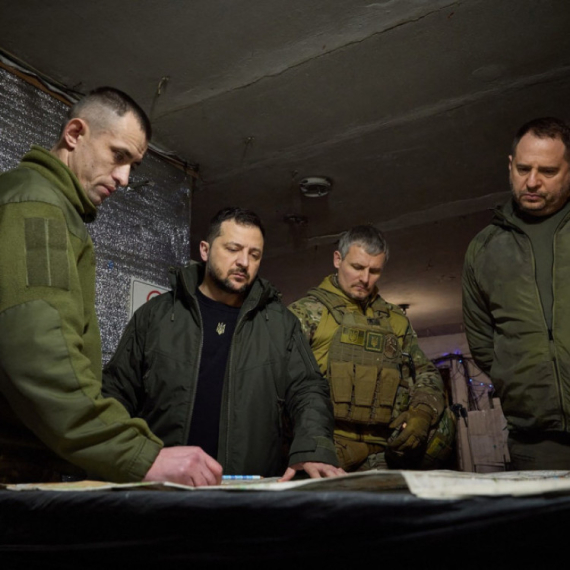Parliament begins debate on Vojvodina statute
The Serbian parliament has started debating the drafts for the Vojvodina statute and the law for transferring authorities to the province.
Tuesday, 24.11.2009.
10:15

The Serbian parliament has started debating the drafts for the Vojvodina statute and the law for transferring authorities to the province. MPs of the ruling coalition and the opposition Liberal Democratic Party (LDP) support the law and statute. Parliament begins debate on Vojvodina statute A majority of the opposition stated that the drafts are unconstitutional and have called for them to be pulled from parliamentary procedures. Prime Minister Mirko Cvetkovic addressed MPs today to present the two drafts sent to parliament by his cabinet, to say that they included three basic principles - the need to expand the existing jurisdictions, to harmonize all the suggested solutions with the Serbian Constitution, and to carry out the process of decentralization of Serbia, as well as the concept of the province's autonomy which ruled out any possible elements of a state. Cvetkovic said that the jurisdictions of Vojvodina could be divided in two groups. The first group comprises basic jurisdictions which define that according to the law, autonomous provinces are in charge of issues which are of provincial significance and which refer to the areas determined by the Constitution. The entrusted jurisdictions, on the other hand, are the ones which define that Serbia can entrust its autonomous provinces with certain issues which the country is normally held responsible for, said the premier. Cvetkovic added that the draft law was prepared in accordance with the provisions of the Constitution, which specify that the power of the state is limited by the citizens' right to provincial autonomy and by the determinants which define the issue of provincial autonomy and the legal status of the provinces. The issues relating to assets and the financing of the jurisdictions of the Autonomous Province of Vojvodina will be determined subsequently, the prime minister said, and invited all the members of parliament to back the proposed bill. Chief of the LDP parliamentary group Cedomir Jovanovic announced that his party would vote for the draft law on determining of jurisdiction of Vojvodina but stated that the proposed solutions were “a compromise of the ruling majority”, which he said was negative. Jovanovic said that it could be concluded from the Cvetkovic’s , "who only quoted the law’s explanation", that the government did not care much about the draft. He added that the ruling coalition was powerless during the making of the draft law and that everything written in it amounts to “running away from the responsibility”, that the law was "unwanted", and that the government hd presented it to the parliament because it could no longer avoid that obligation. Opposition New Serbia (NS) MP Dubravka Filipovski said that this party would not vote in favor of the proposed statute, and that they would ask for its compliance with te4h provisions of the Constitution to be evaluated, should MPs vote to adopt it. “The draft statute represents the biggest danger to Serbia after the 1974 Constitution, the Kumanovo Agreement and Ahtisaari’s plan. This statute continues the process of Serbia's federalization, and, in violation of the Constitution, sovereignty is being given to the residents of Vojvodina,” Filipovski said. She pointed out that the statute draft had to be completely, "rather than mostly", harmonized with the Constitution, and added that more than twenty provisions found in the draft were seen as contentious by her party. The proposed statute would enable inter-regional agreements to be signed by Vojvodina. The province would also be allowed to open its own headquarters in European regions and in Brussels, and a Vojvodina academy of science and art would be founded. The statute draft was adopted by the provincial assembly on October 14, 2008, and was sent to the state parliament in November. However, it was pulled from procedures on November 9 because of technical errors related to the status of Novi Sad in article 10 of the act. After the corrections, Novi Sad was defined as the chief administrative center of Vojvodina, not its capital city, as it was stated earlier. The statute also confirms that the territory of the autonomous province of Vojvodina cannot be changed with the approval of its citizens by way of a referendum. The draft law for confirming the authorities of Vojvodina extends them, while all income and property of the property will be regulated by other specific laws. The law will transfer 20 authorities to Vojvodina, in the fields of spatial planning, regional development, agriculture, waterworks and forestry, hunting and fishing, tourism, hotels and environmental protection. Authorities will also be transferred in the fields of industry and vocations, traffic, employment, education, health and social protection, public information, science and technological development, industry and privatization, mining and energy and local self-administrations. The proposed law calls for Vojvodina to cooperation with territorial communities based on Serbia’s foreign policies, with respect to the territorial integrity of Serbia, and the signing of inter-regional agreement, as well as opening headquarters in European regions and Brussels. The Serbian parliament on Tuesday (Beta)
Parliament begins debate on Vojvodina statute
A majority of the opposition stated that the drafts are unconstitutional and have called for them to be pulled from parliamentary procedures.Prime Minister Mirko Cvetković addressed MPs today to present the two drafts sent to parliament by his cabinet, to say that they included three basic principles - the need to expand the existing jurisdictions, to harmonize all the suggested solutions with the Serbian Constitution, and to carry out the process of decentralization of Serbia, as well as the concept of the province's autonomy which ruled out any possible elements of a state.
Cvetković said that the jurisdictions of Vojvodina could be divided in two groups.
The first group comprises basic jurisdictions which define that according to the law, autonomous provinces are in charge of issues which are of provincial significance and which refer to the areas determined by the Constitution.
The entrusted jurisdictions, on the other hand, are the ones which define that Serbia can entrust its autonomous provinces with certain issues which the country is normally held responsible for, said the premier.
Cvetković added that the draft law was prepared in accordance with the provisions of the Constitution, which specify that the power of the state is limited by the citizens' right to provincial autonomy and by the determinants which define the issue of provincial autonomy and the legal status of the provinces.
The issues relating to assets and the financing of the jurisdictions of the Autonomous Province of Vojvodina will be determined subsequently, the prime minister said, and invited all the members of parliament to back the proposed bill.
Chief of the LDP parliamentary group Čedomir Jovanović announced that his party would vote for the draft law on determining of jurisdiction of Vojvodina but stated that the proposed solutions were “a compromise of the ruling majority”, which he said was negative.
Jovanović said that it could be concluded from the Cvetković’s , "who only quoted the law’s explanation", that the government did not care much about the draft.
He added that the ruling coalition was powerless during the making of the draft law and that everything written in it amounts to “running away from the responsibility”, that the law was "unwanted", and that the government hd presented it to the parliament because it could no longer avoid that obligation.
Opposition New Serbia (NS) MP Dubravka Filipovski said that this party would not vote in favor of the proposed statute, and that they would ask for its compliance with te4h provisions of the Constitution to be evaluated, should MPs vote to adopt it.
“The draft statute represents the biggest danger to Serbia after the 1974 Constitution, the Kumanovo Agreement and Ahtisaari’s plan. This statute continues the process of Serbia's federalization, and, in violation of the Constitution, sovereignty is being given to the residents of Vojvodina,” Filipovski said.
She pointed out that the statute draft had to be completely, "rather than mostly", harmonized with the Constitution, and added that more than twenty provisions found in the draft were seen as contentious by her party.
The proposed statute would enable inter-regional agreements to be signed by Vojvodina. The province would also be allowed to open its own headquarters in European regions and in Brussels, and a Vojvodina academy of science and art would be founded.
The statute draft was adopted by the provincial assembly on October 14, 2008, and was sent to the state parliament in November.
However, it was pulled from procedures on November 9 because of technical errors related to the status of Novi Sad in article 10 of the act.
After the corrections, Novi Sad was defined as the chief administrative center of Vojvodina, not its capital city, as it was stated earlier.
The statute also confirms that the territory of the autonomous province of Vojvodina cannot be changed with the approval of its citizens by way of a referendum.
The draft law for confirming the authorities of Vojvodina extends them, while all income and property of the property will be regulated by other specific laws.
The law will transfer 20 authorities to Vojvodina, in the fields of spatial planning, regional development, agriculture, waterworks and forestry, hunting and fishing, tourism, hotels and environmental protection.
Authorities will also be transferred in the fields of industry and vocations, traffic, employment, education, health and social protection, public information, science and technological development, industry and privatization, mining and energy and local self-administrations.
The proposed law calls for Vojvodina to cooperation with territorial communities based on Serbia’s foreign policies, with respect to the territorial integrity of Serbia, and the signing of inter-regional agreement, as well as opening headquarters in European regions and Brussels.

















































Komentari 4
Pogledaj komentare